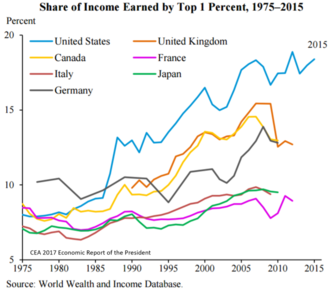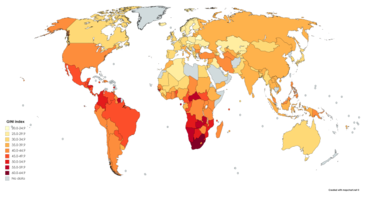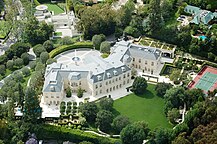


Economic inequality is an umbrella term for a) income inequality or distribution of income (how the total sum of money paid to people is distributed among them), b) wealth inequality or distribution of wealth (how the total sum of wealth owned by people is distributed among the owners), and c) consumption inequality (how the total sum of money spent by people is distributed among the spenders). Each of these can be measured between two or more nations, within a single nation, or between and within sub-populations (such as within a low-income group, within a high-income group and between them, within an age group and between inter-generational groups, within a gender group and between them etc, either from one or from multiple nations).[2]
Income inequality metrics are used for measuring income inequality,[3] the Gini coefficient being a widely used one. Another type of measurement is the Inequality-adjusted Human Development Index, which is a statistic composite index that takes inequality into account.[4] Important concepts of equality include equity, equality of outcome, and equality of opportunity.
Historically, there has been a long-run trend towards greater economic inequality over time. The exceptions to this during the modern era are the declines in economic inequality during the two World Wars and amid the creation of modern welfare states after World War II.[5] Whereas globalization has reduced the inequality between nations, it has increased the inequality within the population in most nations.[6][7][8][9] Income inequality between nations peaked in the 1970s, when world income was distributed bimodally into "rich" and "poor" countries. Since then, income levels across countries have been converging, with most people now living in middle-income countries.[6][10] However, inequality within the population in most has risen significantly in the last 30 years, particularly among advanced countries.[6][7][8][9]
Research has generally linked economic inequality to political and social instability, including revolution, democratic breakdown and civil conflict.[6][11][12][13] Research suggests that greater inequality hinders economic growth and macroeconomic stability, and that land and human capital inequality reduce growth more than inequality of income.[6][14] Inequality is at the center stage of economic policy debate across the globe, as government tax and spending policies have significant effects on income distribution.[6] In advanced economies, taxes and transfers decrease income inequality by one-third, with most of this being achieved via public social spending (such as pensions and family benefits).[6] While the "optimum" amount of economic inequality is widely debated, there is a near-universal belief that complete economic equality (Gini of zero) would be undesirable and unachieveable.[15]: 1
- ^ "GINI index (World Bank estimate) | Data". data.worldbank.org. Retrieved July 23, 2020.
- ^ Ventura, Luca (June 6, 2023). "World Wealth Distribution And Income Inequality 2022". Global Finance Magazine.
- ^ Trapeznikova, Ija (2019). "Measuring income inequality". IZA World of Labor. doi:10.15185/izawol.462.
- ^ Human Development Reports. Inequality-adjusted Human Development Index (IHDI) Archived July 12, 2019, at the Wayback Machine. United Nations Development Programme. Retrieved: March 3, 2019.
- ^ Alfani, Guido (2023). As Gods Among Men: A History of the Rich in the West. Princeton University Press. ISBN 978-0-691-22712-2.
- ^ a b c d e f g "Introduction to Inequality". IMF. Retrieved May 9, 2022.
- ^ a b Bourguignon, François (2015). The Globalization of Inequality. Princeton University Press. ISBN 978-0691160528. Retrieved August 19, 2017.
- ^ a b Hung, Ho-Fung (2021). "Recent Trends in Global Economic Inequality". Annual Review of Sociology. 47 (1): 349–367. doi:10.1146/annurev-soc-090320-105810. ISSN 0360-0572. S2CID 235574406.
- ^ a b Flaherty, Thomas M.; Rogowski, Ronald (2021). "Rising Inequality As a Threat to the Liberal International Order". International Organization. 75 (2): 495–523. doi:10.1017/S0020818321000163. ISSN 0020-8183.
- ^ "Parametric estimations of the world distribution of income". January 22, 2010.
- ^ MacCulloch, Robert (2005). "Income Inequality and the Taste for Revolution". The Journal of Law and Economics. 48 (1): 93–123. doi:10.1086/426881. JSTOR 10.1086/426881. S2CID 154993058.
- ^ Acemoglu, Daron; Robinson, James A. (2005). Economic Origins of Dictatorship and Democracy. Cambridge: Cambridge University Press. doi:10.1017/cbo9780511510809. ISBN 978-0521855266.
- ^ Cederman, Lars-Erik; Gleditsch, Kristian Skrede; Buhaug, Halvard (2013). Inequality, Grievances, and Civil War. Cambridge University Press. doi:10.1017/cbo9781139084161. ISBN 978-1107017429.
- ^ Neves, Pedro Cunha; Afonso, Óscar; Silva, Sandra Tavares (2016). "A Meta-Analytic Reassessment of the Effects of Inequality on Growth". World Development. 78: 386–400. doi:10.1016/j.worlddev.2015.10.038.
- ^ Cite error: The named reference
Peterson_2017was invoked but never defined (see the help page).

